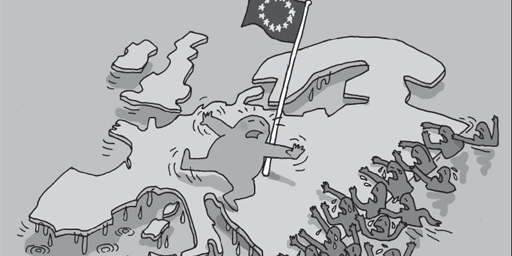
The international refugee crisis has finally reached a turning point. Led by Germany and followed by Austria, European countries have begun to open their borders. But how will the displacement of millions of people from Middle East countries affect Indonesia and our neighbor to the south — Australia?
Many refugees arrive in Indonesia as the nearest transit country on a journey they hope will bring them to safety in Australia, but are frequently abandoned here by people smugglers. Refugees who end up in Indonesia almost invariably apply for refugee status to the UN refugee agency, the UN High Commissioner for Refugees (UNHCR). Its asylum-seeker certificate and refugee card serve as their identity documents. Besides registering with the UNHCR, refugees are also obliged to register with Indonesian immigration authorities. Contrary to the picture painted in Friday’s The Jakarta Post editorial entitled “The refugee tsunami”, they are neither undocumented nor unregistered.
Those who are recognized by the UNHCR as refugees then wait for resettlement in a third country, or voluntary repatriation once it is safe to return to their country of origin. It is a difficult wait, because refugees are not able to work or attend school here, unlike in Malaysia, where the government turns a blind eye to those seeking informal work.
Here, they mostly depend on relatives overseas to send them money. It is not unusual to find refugees sleeping on the streets, or detained in overcrowded immigration lockups. Jakarta’s Kalideres immigration detention center, for example, was built to hold 88 people but last Thursday was packed with 160 detainees. Despite our sympathy for displaced Rohingya, for example, we should not be too proud of ourselves — it is hardly enjoyable for refugees to live in Indonesia.
We should be careful about echoing Australian politicians’ pejorative use of terms such as “queue-jumpers” and “boat people”. People who risk their lives by taking to the seas from our shores are not jumping any real kind of “queue” for resettlement, as figures from the UNHCR in Indonesia show. For refugees registering here, the wait from registration to resettlement is sometimes as long as four to five years, and the proportion of registered refugees who succeed in being resettled from Indonesia is less than two percent. In 2014, there were 838 refugees resettled by the Indonesian office of the UNHCR, while so far in 2015, there have been just 346.
European countries such as Greece that allow refugees to come ashore are doing nothing more than fulfilling an obligation under international law, namely the principle of non-refoulement. The UNHCR has made it clear since 1997 that this provision of the 1951 Refugee Convention means that push-offs of boat arrivals or interdictions on the high seas, as practiced by Australia, are unlawful. Nevertheless, this is what Australian Prime Minister Tony Abbott has shamefully encouraged European governments to adopt, despite their shared status as Refugee Convention signatories.
We should also keep the supposed “devastating impact” of refugee arrivals in perspective. Far from comprising an overwhelming tsunami, the latest data from the International Organization for Migration show that 350,000 refugees have been registered in Europe since January this year.
Even with more on the way, the total by December is unlikely to match one percent of the EU’s 503 million residents. The 13,170 refugees and asylum seekers currently present in Indonesia are a drop in our 250 million-strong ocean.
The economic impact of refugees also tends to be misunderstood. Taking Australia as an example, research released last week by the country’s Bureau of Statistics shows that far from “taking jobs”, refugees are the migrants most likely to secure their own income through establishing small businesses. This hardworking entrepreneurship is a net economic boost to the refugee’s host country, rather than a drain.
Australia’s Tony Abbott announced last week that Australia would take in an extra 12,000 Syrian and Iraqi refugees. This is good news, although Australia could have done more, as urged by tens of thousands of Australians who joined a nationwide “Light the Dark” pro-refugee demonstration on Monday. But Abbott’s new intake also came with the decision to bomb Syria. This is a dangerously flawed approach since it is likely to result in more refugees fleeing Syria. Abbott also said that Australia would prioritize taking in “persecuted minorities sheltering in Jordan, Lebanon and Turkey”, which could result in prioritizing Christian refugees. This also suggests a further dimming of hope for the 715 Iraqis and 90 Syrians living in limbo in Indonesia.
Under current Indonesian law, refugees are treated as illegal migrants, with the risk of lengthy detention in lockups like Kalideres. There exists, however, a long-neglected draft presidential regulation on the handling of refugees and asylum seekers. The draft leaves much room for improvement, but it would at least ensure people fleeing persecution are not criminalized when they reach our country. I am sure President Joko “Jokowi” Widodo is moved, as European leaders are, by the ongoing refugee tragedy. If he wishes to act, he can take the draft regulation off the shelf and ensure it is implemented swiftly, humanely, and in line with the spirit of the Refugee Convention.
Veronica Koman is a public interest lawyer at the Jakarta Legal Aid Institute (LBH Jakarta).
[box type=”note” align=”aligncenter” ]Disclaimer: Seluruh tulisan dalam rubrik Opini merupakan representasi pribadi penulis sebagai personal dan bukan merupakan representasi dari LBH Jakarta.[/box]






